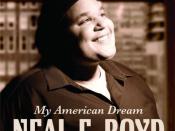The definition of the American Dream is an important theme that is woven throughout the attitudes and actions of Arthur Miller's characters in his play The Death of A Salesman. Happy Loman, a character dominated by his material greed and desire to crush anyone standing between him and the almighty dollar, represents a skewed perspective of that Dream, a perspective shared by an increasingly large amount of Americans. Through his insatiable appetite for power, lust, and wealth, Happy Loman embodies the modern capitalist American Dream. And through his never-ending discontent and incessant feeling of unfulfillment, Happy also embodies the fallacy and shortcomings of that Dream.
One could consider Happy Loman to be a success. He may not be the president of his company (in fact he is one of two assistants to an assistant buyer), but at roughly thirty years of age, he has a steady job and a place of his own.
And he's moving up in the world, he's getting somewhere. And there's nothing wrong with this. American society and capitalism in general is based on the Puritan individualist work ethic, which states that hard work breeds success and happiness.
But Happy isn't succeeding because he works hard, because he's well liked, or because he's exceptionally good at what he does. He's succeeding through the neo-American shortcut to happiness, the modern American Dream, which encourages cut-throat competition at every level. Happy, much like millions of other Americans, is moving up in the world by defeating his competition, by destroying all of those in his way. On page 23 and 24, he says, "All I can do now is wait for the merchandise manager to die"æHe's a good friend of mine."àHappy desires more money, more power, and more responsibility strongly enough that he is willing to lose...


